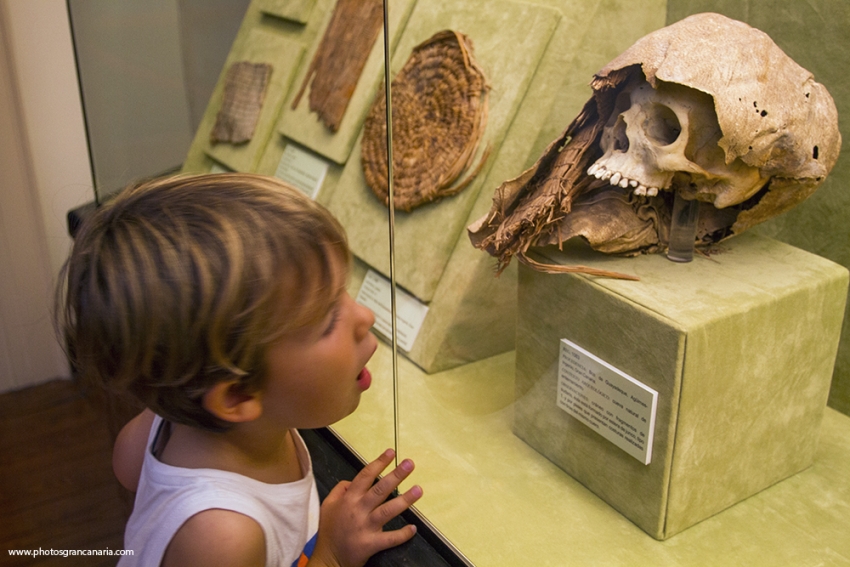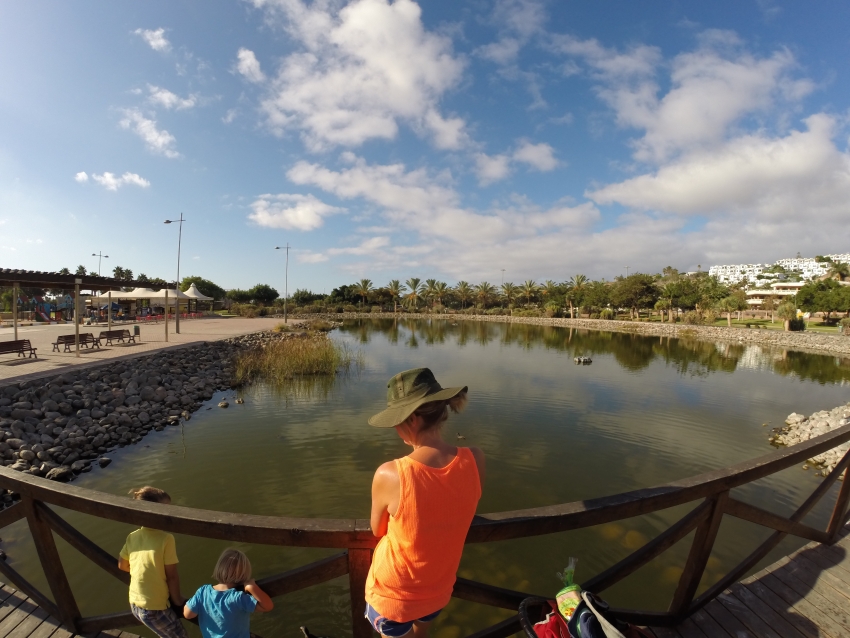Casa de Colón
Christopher Columbus stopped in Las Palmas in 1492 because his crew sabotaged his ships. History hasn't recorded whether they were scared of sailing off the edge of the world or just wanted a holiday.
The Casa de Colón museum, where Columbus stayed, celebrates all things Columbus and the strong links between the Canaries and the Americas. As an added bonus, it's set in a stunning building with one of the island's best traditional courtyards and huge, carved stone doors.
Entry is 4 euros. Open seven days per week. Here's the website.
Museo Canaria
A great little museum with a room full of skulls and mummies as well as Guanche and Canarii pottery and artifacts.
The Museo Canario focuses on the history of the Canaries before the Spanish conquest and does a good job of getting lots of exhibits and info into a small space. It's the best introduction anywhere to the lives of the original Canarians.
Entry is 4 euros. Open weekdays 10.00 to 20.00, weekends and fiestas 10.00 to 14.00. Website here.
Museo Elder
The Las Palmas science museum, in an old warehouse in Santa Catalina square, has lots of interactive experiments to play with, an F5 fighter jet to sit in, an excellent robotic arm gyro ride, lots of cool exhibits like skeletons, and a planetarium. It's a great place to spend a few hours with kids.
Cost is 5 euros per person. The Robocoaster is an extra euro. Open from 10.00 to 20.00 every day except Mondays. Website here.
Museo Diocesano de Arte Sacro
This collection of old paintings and church silver is interesting to art lovers but perhaps not to cultural browsers. However, everybody should visit because it's the only way to get into the cathedral and see its soaring interior and latticed ceiling. Another benefit is the internal courtyard within the museum; one of the best traditional Canarian patios open to the public. Acces is via the doorway on the south wall of the cathedral on appropriately named Calle Espititú Santo.
Access to the cathedral roof is an extra 1.50 euros, but you pay at the front entrance in Plaza Santa Ana.
Entry is 3 euros. Open 10.00 to 16.30 Mondays to Friday and 10.00 to 13.30 on Saturdays.
Alex says: Last chapel on the right by the alter contains a surprise: A mummified bishop in a glass box.
Casa África
More than a museum or gallery, Casa África is actually part of Spain's diplomatic efforts and aims to create and foster ties between the Canary Islands, Spain, África and South America. It's often got interesting displays of African art and history, as well as screening documentaries. It's always worth popping in to see what's on.
Casa África is on Calle Alfonso XIII, 5. See map here.
Exhibits open Monday through Friday from 09.00 to 18.30. Website here.
CAAM
Las Palmas' modern art gallery in Vegueta is set in a vast old building with an open interior. It's collection is based on Canarian modern artists such as Lanzarote's Cesar Manrique and Las Palmas' most famous sculptor Martín Chirino (famous for his bronze spirals). The CAAM also features regular exhibitions from galleries around the world.
CAAM entry costs 5 euros and it's open Tuesday through Saturday from 10.00 to 21.00 and Sundays 10.00 until 14.00 Website here.
Museo Nestor
Néstor was an important Spanish symbolist painter and Gran Canaria's version of Cesar Manrique: A spectacularly talented artist and designer with a vision for his home island. The Néstor museum, set in the Pueblo Canario plaza designed by the artist, is a tribute to the man and his art. It's most famous exhibit is a circular room lined with Néstor's "poem of the sea" series: A stunning series of paintings of monster fish eating naked people during a storm.
The Néstor museum, set in the Pueblo Canario plaza designed by the artist, is a tribute to the man and his art. It's most famous exhibit is a circular room lined with Néstor's monster fish eating naked people paintings but everything on display is quality.
As well as Néstor's art, look out for the early advertising prints by the stairs and works by Agaete artist Pepe Dámaso.
The Museo Nestor opens Tuesday through Saturday 10.00 to 19.00 and Sunday 10.30 to 14.30. Entry costs 2 euros and is well worth it. Website here.
Jardín Canario
Not strictly a museum or a gallery but the Jardín Canario botanical garden, Spain's largest, gets on the list because it's in Las Palmas municipality and is fantastic. It exists to protect and study the 600 unique plants of the Canary Islands (over 100 found only in Gran Canaria) but is an attractive garden in its own right with lakes, forests, cliff paths and lawns.
Most people remember the spectacular cactus garden, but it's the little plants that are the important ones as the garden acts as a refuge for critically endangered species.
Alex says: Take a banana and throw bits on the rocks next to the red stone bridge: The lizards love banana.
Open every day from 0.900 to 18.00. Free entry.
Pérez Galdos
One for the literature buffs: Benito Pérez Galdós was born in Las Palmas in 1843 although he left long before writing any of his famous novels and plays. As one of Spain's leading literary figures, his childhood home in Triana district is now a museum dedicated to his life and works.
Open Tuesday through Sunday from 10.00 to 18.00. Entry is 3 euros. Website here.
Museo de la Ciudad y el Mar
Las Palmas city was on the front line in the battle between Catholic and Protestant Europe during the 16th Century and British and Dutch ships attacked the city on several occasions. Francis Drake failed to take Las Palmas, but Dutch admiral Van Der Does sacked it in 1599 (he died shortly afterwards due to injuries sustained during the Canarian fightback).
The Museo de la Ciudad y el Mar, set in the Castillo de Mata fort on the last remaining part of Las Palmas' defensive wall, is dedicated to the maritime history of Las Palmas. It opened in 2015.
Open Tuesday through Friday from 10.00 to 13.00 and 18.00 to 20.00. Saturdays 11.00 to 14.00.














